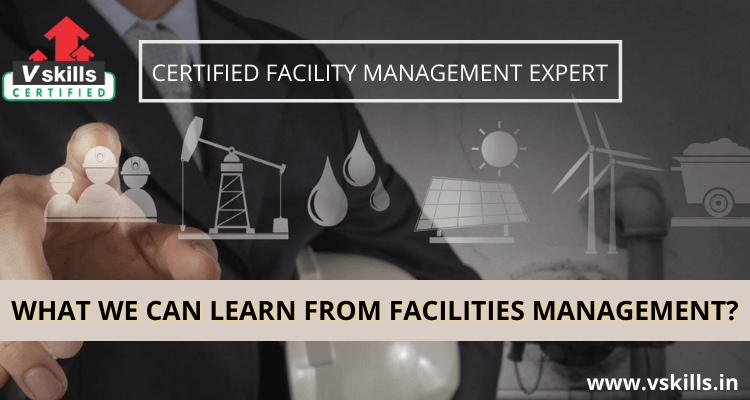Facilities management has evolved thanks to new technologies, innovative customer service strategies, and resources that help organizations manage the building lifecycle with reduced costs. Leading organizations are using a full range of facilities management services, including capital planning and investment control, space planning and design, integrated facilities management (IFM), sustainability management, fire safety, security monitoring, workplace safety, and wellness.
Facility management is a significant area of expertise. There are many opportunities for growth in this field. That’s what this blog post will help you with. We’re going to look at the things that you can learn from facilities management to enhance your ability to consistently produce even better results.
Before we begin with knowing the skills one can gain from facilities management, let us first understand what Facilities Management is.
What is Facilities Management?
Facilities management is the discipline of managing and conducting business operations associated with real estate and building asset management. It encompasses a range of disciplines in core functions, including (but not limited to) engineering, architecture, environmental health and safety, landscaping, cleaning, maintenance, and energy management.
Facilities management is a set of business processes by which an organization effectively and efficiently plans, operates, maintains, and improves all of the buildings and the site infrastructure required for its successful operation. More than simply caring for the premises, FM also encompasses managing the relationships that bring together the people, technology, and resources to operate a building as a safe, secure, comfortable, and sustainable environment.
With the Internet becoming more and more powerful every year, it is no doubt that a lot of facilities management (FM) professionals are keen on modernizing their technologies. Researchers have already begun to use IoT technologies in the areas of facility condition assessment, asset management, energy management, and many other areas.
Saying so, let us understand the responsibilities of Facility Managers, in detail.
What do facility managers do?
Facility managers (FMs) are the behind-the-scenes, troubleshooting stars of the built environment. They ensure that business-critical equipment keeps systems running smoothly and facilities operating efficiently. FMs coordinate the facility’s routine maintenance activities, purchasing supplies, arranging staff training, and ensuring policies and procedures are in place.
Facility managers (FMs) have a diverse range of tasks and responsibilities. They are sometimes known as building managers, space planners, head building engineers, or operations managers. They can oversee the operation and maintenance of commercial buildings, public facilities, colleges and universities, hospitals, and government buildings. The functions they perform are a balancing act between technical skill sets and administration.
The competencies of Facility managers can be summed up in 11 core categories, as listed below –
- Occupancy and human factors
- Operations and maintenance
- Sustainability
- Facility information and technology management
- Risk management
- Communication
- Performance and quality
- Leadership and strategy
- Real estate
- Project management
- Finance and business
To shorten things up, Facilities managers are the individuals responsible for maintaining assets that are in use by capitalizing on their largest return on investment. Let us now check out the skills that are highly anticipated in a Facility Manager.
What can we learn from facilities management?
Facility management is exploding in growth. What is the skill sets that a facility manager should have today? Initially, it was all about buying hardware and software and trying to keep costs down. Today, facility managers have a lot more responsibilities due to technological innovations and improved communication capabilities. The areas of budgeting and forecasting, procurement, and contract negotiation are increasingly important. Facility management is an incredibly broad field with numerous skill sets today including construction, auditing, program management, engineering, and IT. Below-mentioned is some of the highly-demanded skills that you can learn from facilities management.
Project Management
Project management is a core skill in facility management. It is important to understand the process, participants, and deliverables, as they will greatly influence the project outcome. It is one of the most challenging, yet rewarding, aspects of facility management. The projects can vary in scope, complexity, duration, and financial risks.
Leadership & Strategy
Facility managers are at the center of all facility activity as they manage the relationship between each business area and its infrastructure. Their ability to work in alignment with senior management and use their expertise in the Area of Competence (AOC) will greatly dictate how well they redefine their organization’s current portfolio.
Facility managers must lead the facility organization by providing guidance to staff and service providers, and they must influence the decisions and attitudes of the demand organization’s leaders as well as that of occupants, government officials, suppliers, community leaders, and business partners.
Operations & Maintenance
As a facility manager, you are first and foremost a manager in the sense of being an administrator who plans, organizes, directs, and coordinates the work of others. In this role, you must establish long-range goals to meet the needs of the entire organization (and not just those of your department). You also must ensure that your department operates effectively at all times.
The facility manager is an integral part of the facilities management team whose sole purpose is to assist the program or project manager in achieving the desired objectives of the facility owner. The modern facility manager must be aware of all levels within an organization to ensure efficient building operation and maintenance.
Finance & Business Management
Finance and business management encompasses a broad range of responsibilities that include the development, interpretation, use, and management of information related to the operation of FM services. This includes operating and capital budgets, financial reporting, accounting, financial analyses as well as forecasting tools such as spreadsheets or modeling from budgeting to automated applications. Business management should also provide advice to management on key financial issues.
Sustainability
Facility compliance is a never-ending process. Building and safety codes change, health and safety risks grow, technologies and processes evolve. Facility managers can take important steps to protect the environment and the people who occupy their facilities while supporting organizational effectiveness and minimizing risks and liabilities. They must assess the overall effects of facilities on the environment at the earliest stage in all facility planning, design, construction, and management processes.
Communication
Every manager and leader has, at some point, been required to develop a communication plan. The process of developing a communication plan seems rather straightforward-you assess your audience, design a message that is tailored to the audience and deliver it using multiple methods. However, what is often not thought about are all the different stakeholders who need to know about what a project is doing, its status, and progress.
Getting a handle on how to communicate with your stakeholders is one of the most important parts of running a successful project. It may not be glamorous, it may take up a lot of your time and energy, but it will determine if you’re successful or not.
Occupancy & Human Factors Management
Protecting the environment means less stress on resources, cost savings, and a better quality of life. Facilities managers are responsible for identifying the impacts of facilities- both direct and indirect- on the environment and human health. Let’s be honest – managing a building is a complex process, and there’s a lot to do. It can be easy to get lost in all the information out there. But as a facility manager, you have a dual responsibility to support organizational effectiveness and minimize risks and liabilities. You also have a crucial role in supporting sustainability initiatives that are becoming the new normal in corporate settings.
Performance & Quality Management
Facility managers make continual improvements to facilities through continuous processes of measuring the performance of the facility organization. Facility managers have a responsibility to provide high-quality services and facilities that meet the needs of their internal and external customers. The performance of facility management is evaluated by measuring functional areas, such as operating expenses, occupancy rates, energy conservation, and safety.
Facility Information Management & Technology Management
Facility management is the integration of people, processes, technology, and premises to achieve a common goal for cost control, safety, and security management. It is a highly advanced field of study that ensures facilities are well kept and operational 24/7/365. Facility information managers are responsible for the day-to-day operation of the department; making sure all physical assets are maintained properly, the property is secured, goals of daily goals are met efficiently; all while ensuring condition reporting has complied consistently. Facility information managers have the responsibility for supervising Information Technology staff on an as-needed basis, though it is usually a separate department within the company where IT staff are hired and trained independently. Facility information managers also create reports from the submitted data and compile them.
Real Estate Management
Real estate (property) management is a big part of running any business, including your own. By managing real estate assets, you are dealing with buildings that house your products and equipment, storage facilities for inventory and raw materials, and the office space where employees work. But managing a real estate portfolio is about more than owning property. It is the process of obtaining a return on an invested capital.
Real estate investments can have a major impact on the financial success of a company and should not be placed in the hands of someone who is unfamiliar with real estate practices. Businesses normally require the expertise of a professional facilities manager to oversee facility issues and provide expert advice about how to make profitable use of their current assets.
Risk Management
Despite all your best efforts to keep your emergency management plan up to date, there are some things that can’t be planned for. One of those is human error. Planning for human error as a natural disaster inevitability is the best defense against these common disasters, but what should you do to help prevent mistakes from being made that could cost thousands of dollars?
Facility Managers are to present a risk-based approach encompassing multiple disciplines, including emergency management, building science, security, facility maintenance, and engineering disciplines.
Now that you know the areas in which you’ll gain expertise via facilities management, you might want to know how you can acquire them and become a Facility Manager.
How to Become a Facility Manager?
Although working in the field may seem the best way to get into facilities management, but it requires a strong personality. Not everyone has enough confidence to jump into the market with feet first. So, why not check out these several ways to get started in facilities management without working your feet off at work.
Getting a Bachelor’s degree in Business
A bachelor’s degree in business administration is a common first step for facility managers. There’s no specific association of a business degree to facility management, and employers will want to see that you have analytical and organizational skills, and an ability to work with people. Facility managers are often called upon when something needs to get done.
Getting accreditations specific to facilities management
If you are in the facilities management (FM) industry, you know that there is a constant need to stay educated, both for personal and career advancement. This is often accomplished through continuing education classes that round out classroom learning from college or your facility management apprenticeship.
Getting accreditations specific to facilities management, as well as industry-related certifications, is important for establishing credibility with clients and employers and to demonstrate that you’ll be able to deliver effective service.
Certification courses by verified educatrs – Vskills, Udemy, Coursera, etc.
Since the past few years, certification courses have become very popular. These certification courses can be taken online from various vendors like Udemy, Vskills, Coursera, and many more. These are highly in demand and can be used to improve your skills and get a real job.
Having said that, certification courses are highly recommended for candidates seeking to secure a job in a competitive domain. Students have enough advantage in competition from corporate candidates if they possess a certification course certificate from a reputed certification body. Saying so, we now present you with a verified certification on Facilities Management by Vskills.
Certified Facility Management Expert
Facility management is difficult and challenging due to the multi-dimensional and complex nature of the profession. Vskills certification will guide you to the professional practice of facility management, highlighting the ethical standards that will help you perform your job well. With this certification, you’ll be able to create a comfortable environment in the workplace that has increasingly become significant, considering changed conditions in the environment (green revolution, increased urbanization), complex nature and rigors of tasks, innovative technologies, diversity in generations and cultures, etc.
This certification will teach you the basics of facilities management, its application & usefulness, and you will gain the skills to improve your performance.
Study & Learn
- health and safety;
- building and grounds maintenance;
- cleaning;
- utilities and communications infrastructure
- procurement
- contract management;
- security;
- space management
Test Details
- Duration: 60 minutes
- No. of questions: 50
- Maximum marks: 50, Passing marks: 25 (50%).
- There is NO negative marking in this module.
- Mode: Online exam.
Benefits of Certification
- Firstly, Government Certification
- Also, Certification valid for life
- In addition, Lifelong e-learning access
- Furthermore, Free Practice Tests
- Moreover, Get tagged as ‘Vskills Certified’ On Monsterindia.com
- Above all, Get tagged as ‘Vskills Certified’ On Shine.com
Facility Management Course Details
The certification will cover the following topics –
Facility Management Basics
- Firstly, What is FM
- Secondly, Facility Management Philosophy
- Thirdly, Why FM
- Then, FM Functions
- Further, Building Services
- Also, Maintenance Approach
- Then, Preventive Maintenance
- Furthermore, Reliability
- Building Inspection
- Lastly, Emergency Planning
Civil Maintenance
- Cracks in Building
- Corrosion
- Maintenance of Unplastered Surface
- Stairs
- Doors and Windows
- Paints
- Painted Surfaces
- Floors
- Glass
- Roofing and Ceiling
Water Supply and Sanitary
- Plumbing and Sanitary
- Unclogging
- Water Leakage
- Tanks and Sewer Line
- Toilets
Electrical and Airconditioning
- Electrical Wiring
- Lighting
- Power Distribution
- Escalator or Lifts
- Electric Motors
- Air Conditioning
Work Management
- Work Scheduling
- Time Management
- Human Resource
- Team Management
- Manage and Oversee Work
- Outsourcing
Maintenance Management
- Firstly, Maintenance Basics
- Secondly, Maintenance Standards
- Thirdly, Predictive Maintenance
- Then, Maintenance Cost control and EUL
- Also, Repair Diagnosis
- Further, Maintenance Optimization
- Lastly, FMEA
Financial Management
- Firstly, Financial Management Basics
- Secondly, Budgeting
- Thirdly, Contracts Management
- Then, Procurement
- Lastly, Legal Implications
Leadership and Strategy
- Strategic Planning
- Lead the Facility Organization
- FM Leadership
- Becoming an FM Leader
Health and Safety
- Occupational Health
- Fire and Life Safety
- Pest Control
- Waste Management
- Contingency Plan
- Risk Management
Environmental Sustainability
- Environmental stewardship
- Facility Planning
- Energy Management
- Green Energy
- LEED certification
Application of Technology
- Building Automation System
- Energy Management System
- Integrated Workplace Management Systems
You can also use the online tutorials and free practice tests by VSkills to prepare for this certification exam. There are also some reference books suggested which can help you to grasp the concepts in a better manner.
Vskills Online Tutorial
If you’re a self-starter that’s always learning on your own, then Vskills offers online tutorials and courses to help learn all facilities management skills. Our training is designed keeping in mind the requirements of the corporate sector so that you can easily fit into business requirements and achieve your professional growth.
Vskills Free Practice Tests
Practice is the way to judge your aptitude levels. Take as many sample tests as possible by registering yourself on various websites. This will give you an idea of your weaknesses and how to improve your overall performance. We offer free online practice test series through its web portal. These practice tests are powered by experts who have sound knowledge and experience in their respective domains. As these practice tests are online, you can take them from anywhere and at any time according to your schedule. So, go ahead and grab a free practice test here!
Let us now know why facility management is more relevant than ever in today’s world.
Why is facilities management so crucial?
The Facilities Management sector encompasses a wide range of skill sets required to manage not only the physical structure of a building but also its systems, the software that makes it run, and the occupants who use it. From architects to engineers to janitors, every role is vital in maintaining that building’s best interests.
To sum up, Facilities management contribute to an organization’s business strategy and bottom line:
- Firstly, impacting operational efficiencies
- Secondly, supporting the productivity of facilities and personnel
- Also, managing risks to facilities and personnel
- Then, mitigating environmental impact
- Further, promoting sustainable tactics for long-term cost management
- Subsequently, leveraging technological solutions
- Then, educing or overcoming the effects of natural disasters
- Last but not the least, guaranteeing compliance
- Finally, leveraging security
Let us now wind up by providing you an amazing reason to choose this field.
Final Words
The world of facilities management is one that has never been mission-critical to ensuring the success of the business. No matter where you go, any manager with an eye for detail can see that there are billions of dollars worth of assets t at risk in a facility – not just building, but also up to date technology, staff, and product inventory as well as many other items. Facilities management is tied to so many aspects of a business that without it you would be exposed to unnecessary risk – your assets may suffer damage, your client services could be degraded and ultimately your company’s financial performance may suffer.





